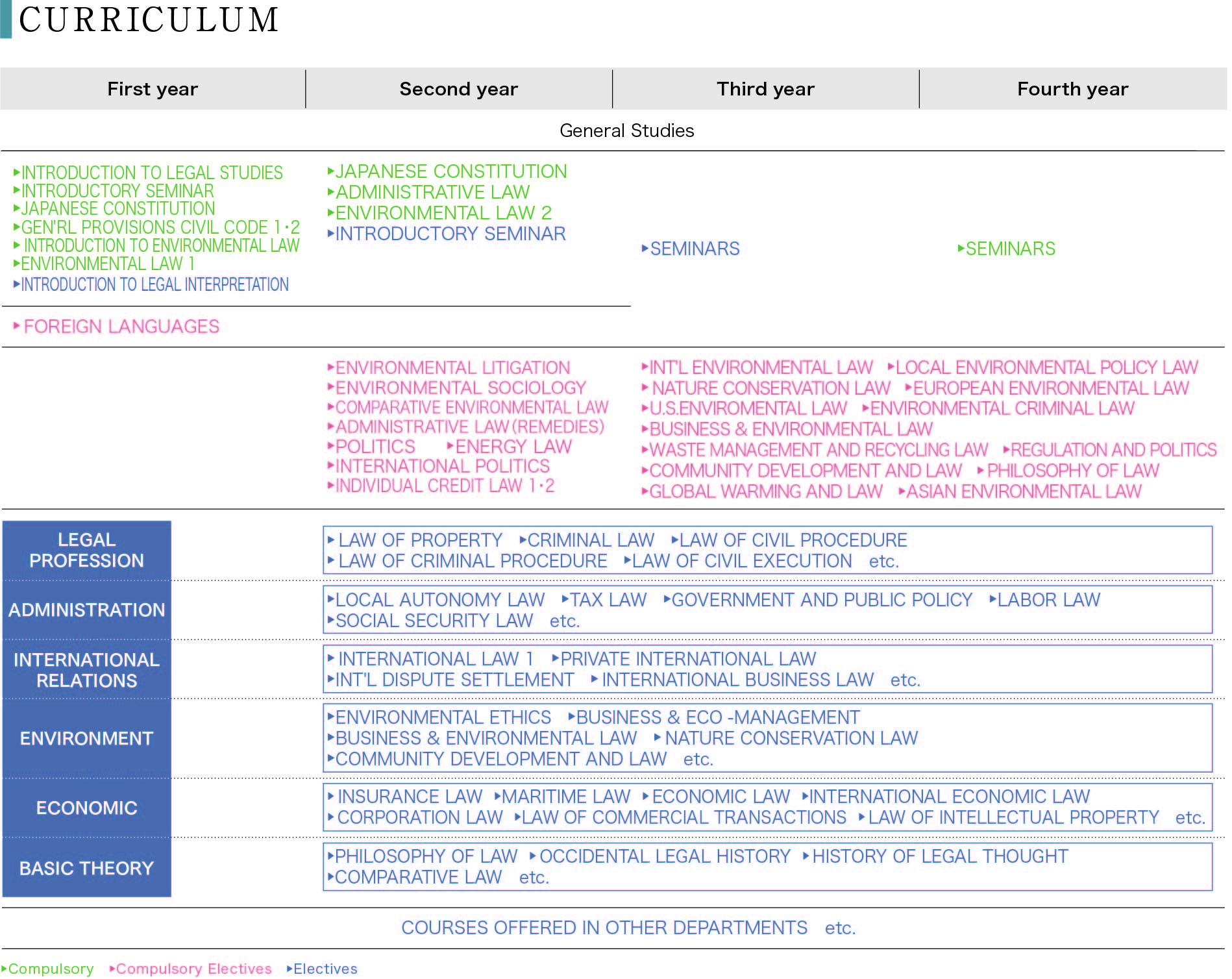Department of Legal Studies of the Global Environment


Department Features
Radioactive pollution, global warming, acid rain, ozone layer depletion, ocean pollution, expanding desertification, illegal dumping of waste, asbestos problems, and other serious threats to the survival of the human race are occurring on a global scale. Damage done to health and the environment is unquestionably irreversible but without a legal framework, serious environmental problems will be left unsolved. To meet the demands and expectations of modern society, the Department of Global Environmental Law aims to train various types of professionals, such as government officials with expertise in environmental administration and policy, lawyers who deal with environmental issues, experts in environmental measures in companies, and staff of environmental NGOs.
Special Course in Global Environmental Law
Students in the Department of Legal Studies of the Global Environment can take regular courses as law students, or can concentrate on environmental law-related courses. The Department of Legal Studies of the Global Environment maintains a Special Course dedicated to environmental law, and certifies course completion for students who complete the course with high grades. We look forward to many students receiving certification and going on to become specialists in environmental law.
Curriculum
After taking basic legal subjects, students will learn the basic subjects Introduction to Environmental Law and General Theory of Environmental Law, and then progress to specialization subjects such as Environmental Litigation Law and Nature Conservation Law to acquire knowledge and thinking skills on environmental-related rules around the world. The relationship between the environment and law in different settings, such as government and business, and the state of environmental law in different regions, such as the United States, Europe, and Asia, are also explored. In addition to the knowledge and legal thinking skills in global and Japanese legal systems concerning environmental issues, the perspective of international and comparative law gained through the courses offered by the Department of International Legal Studies, as well as the interdisciplinary knowledge acquired from political science, public administration, and other multidisciplinary approaches will also be an asset for creating and supporting a sustainable society.
as of 2022
* Please refer to the syllabus for more information on the courses.
Course Examples
- Environmental Law
The diversification and internationalization of environmental issues has resulted in a number of national laws and international treaties in the field of environmental law. As more and more progressive court decisions emerge, the lectures will provide an overview of environmental legislation using these specific cases as the subject matter.
- Local Government Environmental Law
The laws and policies surrounding municipal environmental administration will be explained, touching on ordinances, key networks, agreements, and environmental assessments. Guest speakers will be invited to give special lectures to deepen understanding of the full context in line with actual situations in municipal environmental administrations.
- Nature Conservation Law
Laws aimed at environmental conservation and laws closely related to nature conservation will be reviewed and their significance and issues will be discussed. Individual laws and regulations, such as the Natural Environment Conservation Law and the Natural Parks Law, are also discussed.
- Environmental Litigation I, II
This course covers the theory and practice of environmental litigation, a method of resolving environmental disputes through judicial review, by examining precedents and case studies of various environmental lawsuits, including air pollution, water pollution, noise, violation of daylight and scenic views, soil pollution, etc.
- Environmental Law II
This course builds on the knowledge gained in a general overview and takes an in-depth look at major domestic environmental laws. While following the articles and court decisions, we will examine how environmental law approaches various types of environmental issues through a legal mechanism based on the ideas of environmental law.
- Waste Management and Recycling Law
As a segment of environmental law, waste and recycling legislation has the important mission of realizing the sustainable development of society. In this course, students will learn about related legal systems, with a focus on waste management and disposal laws.
Available Teaching Licenses and Subjects
Law students are not eligible to take teaching courses.
Curatorial courses are available.
Educational Objectives and Policies
-
To acquire an understanding of the global and Japanese legal systems related to environmental issues, and to develop the ability to examine environmental issues from a legal perspective in a comprehensive and multifaceted manner.
-
To train researchers in environmental law, experts in environmental law related to corporate activities, competent businessperson with deep knowledge of environmental law and those who can play an active role in environmental NGOs, and those can contribute to the development of their home countries with their expertise in environmental law.
-
With the aim of developing human resources with following qualities and abilities to help realize a sustainable society that takes the global environment into consideration, the Department has established the following abilities and knowledge that students should have acquired at the time of graduation. Upon completion of graduation requirements, students are recognized as having mastered these requirements and are awarded a degree.
- A firm understanding of the basic knowledge in the Japanese legal system and a solid problem-solving skills and effective application of knowledge in real world.
- Ability to understand Japan’s evolving legal system with respect to environmental issues, and to consider optimal problem-solving methods with attention to difference in each problem area.
- Ability to study the legal systems of foreign countries and the international community with regard to environmental issues and to think about the issues from a global perspective
- Ability to consider future policies that contribute to solving environmental problems from an interdisciplinary perspective that is not limited to law
-
The Department organizes its curriculum in accordance with the Diploma Policy as follows:
- Lectures on fundamental subjects such as Constitutional Law and Civil Law as mandatory courses, as well as a wide range of elective courses that can be selected according to students’ needs, in order to cultivate a background knowledge in Japanese law and a basic framework for legal reasoning
- lectures related to Japanese environmental law will be offered as mandatory courses, and lectures related to individual environmental law systems and other subjects will be arranged as elective and mandatory courses in order to cultivate the ability to apply legal knowledge and frameworks to various environmental issues,
- Lectures related to environmental law in foreign countries and international society are arranged as elective required and elective courses to develop an advanced international perspective.
- Lectures related to adjacent subjects such as political science and sociology are arranged as elective required and elective courses to gain interdisciplinary perspective on environmental law and policy.
- Small-group exercises are arranged as introductory courses for Freshman students and as mandatory courses for Senior students (third-year students may also take these courses), in order to deepen the understanding of related subjects and to comprehensively improve the ability in verbal and written arguments, constructive communication, and practical problem-solving skills.
-
The Department of Law and Political Science cultivates the ability to contribute to addressing the environmental issues facing Japan and the world, primarily from the perspectives of law and political science. Therefore, we are looking for students with:
- Strong interest in the human and social aspects of environmental issues
- Broad interest in current topics in other countries and international affairs, a certain level of language proficiency, and the ability to deal with globalizing environmental issues.
- Flexible and broad interests in the social sciences in general
Faculty Members
Kazufumi ABE Professor
Yoshinobu KITAMURA Professor
Yushin KUWAHARA Professor
Keiichi CHIKUSHI Professor
Koichi TOMINAGA Professor
Takeo HORIGUCHI Professor
Mari MIURA Professor
